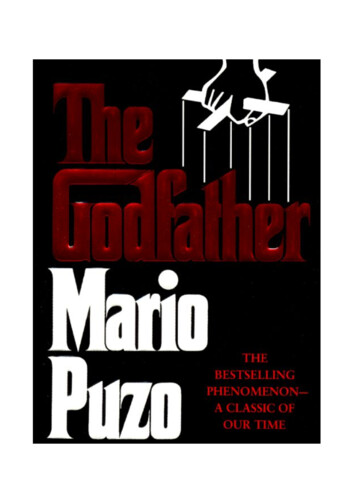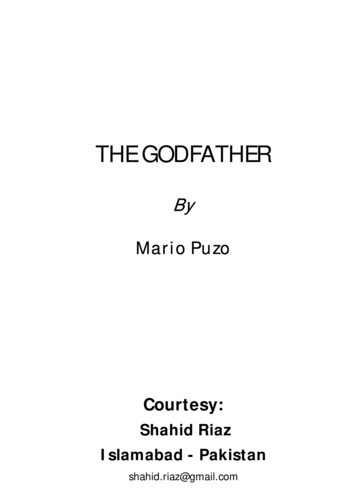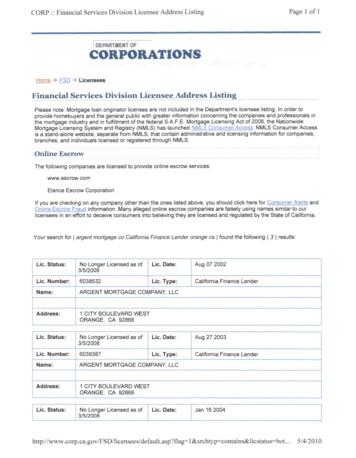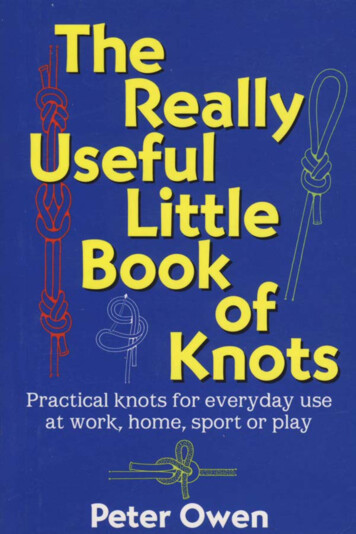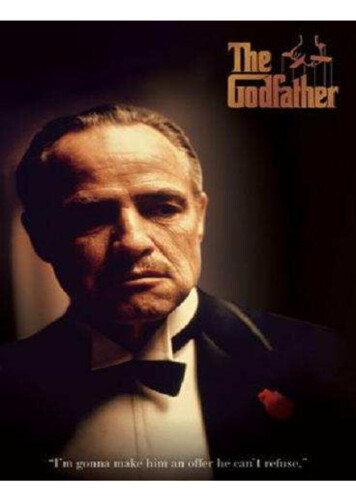
Transcription
1
THE GODFATHER2
“THE GODFATHER IS A STAGGERING TRIUMPH.THE DEFINITIVE NOVEL ABOUT ASINISTER FRATERNITY OF CRIME.”--Saturday Review“YOU CAN’T STOP READING IT, AND YOU’LL FIND IT HARD TO STOP DREAMINGABOUT IT!”--New York Magazine3
THE GODFATHERMario PuzoCopyright Mario Puzo 1969All rights reserved4
For Anthony CleriAbout the AuthorMario Puzo was born on Manhattan’s West Side in a neighborhood known for decades asHell’s Kitchen. His first books, The Fortunate Pilgrim (“a minor classic” NY Times) and DarkArena, brought him critical acclaim, but it was publication of The Godfather in March 1969, thatcatapulted him into the front ranks of American authors. Reviewers hailed the book as “astaggering triumph” (Saturday Review), “big, turbulent, highly entertaining” (Newsweek),“remarkable” (Look), “a voyeur’s dream, a skillful fantasy of violent personal power” (NewYork Times). Winning readers by the millions, it stayed at or near the top of the New York Timesbest-seller lists for sixty-nine weeks. Fools Die, Mario Puzo’s brilliant new novel about thefeverish world of the big-time gambler, has been hailed as the publishing event of the decade.5
BOOK IBehind every great fortune there is a crime.--BALZAC6
Chapter 1Amerigo Bonasera sat in New York Criminal Court Number 3 and waited for justice;vengeance on the men who had so cruelly hurt his daughter, who had tried to dishonor her.The judge, a formidably heavy-featured man, rolled up the sleeves of his black robe as ifto physically chastise the two young men standing before the bench. His face was cold withmajestic contempt. But there was something false in all this that Amerigo Bonasera sensed butdid not yet understand.“You acted like the worst kind of degenerates,” the judge said harshly. Yes, yes, thoughtAmerigo Bonasera. Animals. Animals. The two young men, glossy hair crew cut, scrubbedclean-cut faces composed into humble contrition, bowed their heads in submission.The judge went on. “You acted like wild beasts in a jungle and you are fortunate you didnot sexually molest that poor girl or I’d put you behind bars for twenty years.” The judge paused,his eyes beneath impressively thick brows flickered slyly toward the sallow-faced AmerigoBonasera, then lowered to a stack of probation reports before him. He frowned and shrugged asif convinced against his own natural desire. He spoke again.“But because of your youth, your clean records, because of your fine families, andbecause the law in its majesty does not seek vengeance, I hereby sentence you to three years’confinement to the penitentiary. Sentence to be suspended.”Only forty years of professional mourning kept the overwhelming frustration and hatredfrom showing on Amerigo Bonasera’s face. His beautiful young daughter was still in the hospitalwith her broken jaw wired together; and now these two animales went free? It had all been afarce. He watched the happy parents cluster around their darling sons. Oh, they were all happynow, they were smiling now.The black bile, sourly bitter, rose in Bonasera’s throat, overflowed through tightlyclenched teeth. He used his white linen pocket handkerchief and held it against his lips. He wasstanding so when the two young men strode freely up the aisle, confident and cool-eyed, smiling,not giving him so much as a glance. He let them pass without saying a word, pressing the freshlinen against his mouth.The parents of the animales were coming by now, two men and two women his age but7
more American in their dress. They glanced at him, shamefaced, yet in their eyes was an odd,triumphant defiance.Out of control, Bonasera leaned forward toward the aisle and shouted hoarsely, “You willweep as I have wept--I will make you weep as your children make me weep”--the linen at hiseyes now. The defense attorneys bringing up the rear swept their clients forward in a tight littleband, enveloping the two young men, who had started back down the aisle as if to protect theirparents. A huge bailiff moved quickly to block the row in which Bonasera stood. But it was notnecessary.All his years in America, Amerigo Bonasera had trusted in law and order. And he hadprospered thereby. Now, though his brain smoked with hatred, though wild visions of buying agun and killing the two young men jangled the very bones of his skull, Bonasera turned to hisstill uncomprehending wife and explained to her, “They have made fools of us.” He paused andthen made his decision, no longer fearing the cost. “For justice we must go on our knees to DonCorleone.”In a garishly decorated Los Angeles hotel suite, Johnny Fontane was as jealously drunkas any ordinary husband. Sprawled on a red couch, he drank straight from the bottle of scotch inhis hand, then washed the taste away by dunking his mouth in a crystal bucket of ice cubes andwater. It was four in the morning and he was spinning drunken fantasies of murdering his trampywife when she got home. If she ever did come home. It was too late to call his first wife and askabout the kids and he felt funny about calling any of his friends now that his career was plungingdownhill. There had been a time when they would have been delighted, flattered by his callingthem at four in the morning but now he bored them. He could even smile a little to himself as hethought that on the way up Johnny Fontane’s troubles had fascinated some of the greatest femalestars in America.Gulping at his bottle of scotch, he heard finally his wife’s key in the door, but he keptdrinking until she walked into the room and stood before him. She was to him so very beautiful,the angelic face, soulful violet eyes, the delicately fragile but perfectly formed body. On thescreen her beauty was magnified, spiritualized. A hundred million men allover the world were inlove with the face of Margot Ashton. And paid to see it on the screen.“Where the hell were you? Johnny Fontane asked.8
“Out fucking,” she said.She had misjudged his drunkenness. He sprang over the cocktail table and grabbed her bythe throat. But close up to that magical face, the lovely violet eyes, he lost his anger and becamehelpless again. She made the mistake of smiling mockingly, saw his fist draw back. Shescreamed, “Johnny, not in the face, I’m making a picture.”She was laughing. He punched her in the stomach and she fell to the floor. He fell on topof her. He could smell her fragrant breath as she gasped for air. He punched her on the arms andon the thigh muscles of her silky tanned legs. He beat her as he had beaten snotty smaller kidslong ago when he had been a tough teenager in New York’s Hell’s Kitchen. A painfulpunishment that would leave no lasting disfigurement of loosened teeth or broken nose.But he was not hitting her hard enough. He couldn’t. And she was giggling at him.Spread-eagled on the floor, her brocaded gown hitched up above her thighs, she taunted himbetween giggles. “Come on, stick it in. Stick it in, Johnny, that’s what you really want.”Johnny Fontane got up. He hated the woman on the floor but her beauty was a magicshield. Margot rolled away, and in a dancer’s spring was on her feet facing him. She went into achildish mocking dance and chanted, “Johnny never hurt me, Johnny never hurt me.” Thenalmost sadly with grave beauty she said, “You poor silly bastard, giving me cramps like a kid.Ah, Johnny, you always will be a dumb romantic guinea, you even make love like a kid. Youstill think screwing is really like those dopey songs you used to sing.” She shook her head andsaid, “Poor Johnny. Goodbye, Johnny.” She walked into the bedroom and he heard her turn thekey in the lock.Johnny sat on the floor with his face in his hands. The sick, humiliating despairoverwhelmed him. And then the gutter toughness that had helped him survive the jungle ofHollywood made him pick up the phone and call for a car to take him to the airport. There wasone person who could save him. He would go back to New York. He would go back to the oneman with the power, the wisdom he needed and a love he still trusted. His Godfather Corleone.The baker, Nazorine, pudgy and crusty as his great Italian loaves, still dusty with flour,scowled at his wife, his nubile daughter, Katherine, and his baker’s helper, Enzo. Enzo hadchanged into his prisoner-of-war uniform with its green-lettered armband and was terrified thatthis scene would make him late reporting back to Governor’s Island. One of the many thousands9
of Italian Army prisoners paroled daily to work in the American economy, he lived in constantfear of that parole being revoked. And so the little comedy being played now was, for him, aserious business.Nazorine asked fiercely, “Have you dishonored my family? Have you given my daughtera little package to remember you by now that the war is over and you know America will kickyour ass back to your village full of shit in Sicily?”Enzo, a very short, strongly built boy, put his hand over his heart and said almost in tears,yet cleverly, “Padrone, I swear by the Holy Virgin I have never taken advantage of yourkindness. I love your daughter with all respect. I ask for her hand with all respect. I know I haveno right, but if they send me back to Italy I can never come back to America. I will never be ableto marry Katherine.”Nazorine’s wife, Filomena, spoke to the point. “Stop all this foolishness,” she said to herpudgy husband. “You know what you must do. Keep Enzo here, send him to hide with ourcousins in Long Island.”Katherine was weeping. She was already plump, homely and sprouting a faint moustache.She would never get a husband as handsome as Enzo, never find another man who touched herbody in secret places with such respectful love. “I’ll go and live in Italy,” she screamed at herfather. “I’ll run away if you don’t keep Enzo here.”Nazorine glanced at her shrewdly. She was a “hot number” this daughter of his. He hadseen her brush her swelling buttocks against Enzo’s front when the baker’s helper squeezedbehind her to fill the counter baskets with hot loaves from the oven. The young rascal’s hot loafwould be in her oven, Nazorine thought lewdly, if proper steps were not taken. Enzo must bekept in America and be made an American citizen. And there was only one man who couldarrange such an affair. The Godfather. Don Corleone.All of these people and many others received engraved invitations to the wedding of MissConstanzia Corleone, to be celebrated on the last Saturday in August 1945. The father of thebride, Don Vito Corleone, never forgot his old friends and neighbors though he himself nowlived in a huge house on Long Island. The reception would be held in that house and thefestivities would go on all day. There was no doubt it would be a momentous occasion. The warwith the Japanese had just ended so there would not be any nagging fear for their sons fighting in10
the Army to cloud these festivities. A wedding was just what people needed to show their joy.And so on that Saturday morning the friends of Don Corleone streamed out of New YorkCity to do him honor. They bore cream-colored envelopes stuffed with cash as bridal gifts, nochecks. Inside each envelope a card established the identity of the giver and the measure of hisrespect for the Godfather. A respect truly earned.Don Vito Corleone was a man to whom everybody came for help, and never were theydisappointed. He made no empty promises, nor the craven excuse that his hands were tied bymore powerful forces in the world than himself. It was not necessary that he be your friend, itwas not even important that you had no means with which to repay him. Only one thing wasrequired. That you, you yourself, proclaim your friendship. And then, no matter how poor orpowerless the supplicant, Don Corleone would take that man’s troubles to his heart. And hewould let nothing stand in the way to a solution of that man’s woe. His reward? Friendship, therespectful title of “Don,” and sometimes the more affectionate salutation of “Godfather.” Andperhaps, to show respect only, never for profit, some humble gift--a gallon of homemade wine ora basket of peppered taralles specially baked to grace his Christmas table. It was understood, itwas mere good manners, to proclaim that you were in his debt and that he had the right to callupon you at any time to redeem your debt by some small service.Now on this great day, his daughter’s wedding day, Don Vito Corleone stood in thedoorway of his Long Beach home to greet his guests, all of them known, all of them trusted.Many of them owed their good fortune in life to the Don and on this intimate occasion felt free tocall him “Godfather” to his face. Even the people performing festal services were his friends.The bartender was an old comrade whose gift was all the wedding liquors and his own expertskills. The waiters were the friends of Don Corleone’s sons. The food on the garden picnic tableshad been cooked by the Don’s wife and her friends and the gaily festooned one-acre garden itselfhad been decorated by the young girl-chums of the bride.Don Corleone received everyone--rich and poor, powerful and humble--with an equalshow of love. He slighted no one. That was his character. And the guests so exclaimed at howwell he looked in his tux that an inexperienced observer might easily have thought the Donhimself was the lucky groom.Standing at the door with him were two of his three sons. The eldest, baptized Santino butcalled Sonny by everyone except his father, was looked at askance by the older Italian men; with11
admiration by the younger. Sonny Corleone was tall for a first-generation American of Italianparentage, almost six feet, and his crop of bushy, curly hair made him look even taller. His facewas that of a gross Cupid, the features even but the bow-shaped lips thickly sensual, the dimpledcleft chin in some curious way obscene. He was built as powerfully as a bull and it was commonknowledge that he was so generously endowed by nature that his martyred wife f
His Godfather Corleone. The baker, Nazorine, pudgy and crusty as his great Italian loaves, still dusty with flour, scowled at his wife, his nubile daughter, Katherine, and his baker’s helper, Enzo. Enzo had changed into his prisoner-of-war uniform with its green-lettered armband and was terrified that this scene would make him late reporting back to Governor’s Island. One of the many .
